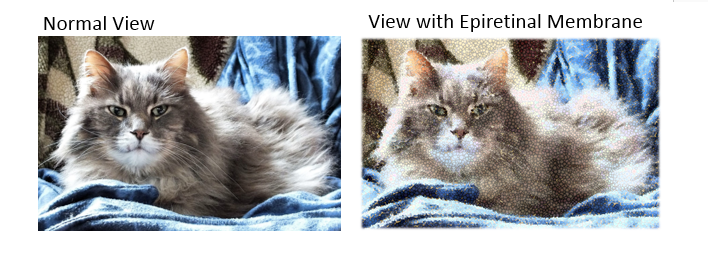A normal configuration of the macula is needed in order to see clearly. Sometimes, scar tissue called an epiretinal membrane (or macular pucker) can grow on top of the macula. This scar tissue can contract and distort the normal configuration of the macula, thereby affecting vision


Epiretinal membranes can occur for several reasons. The most common reason they occur is after a Posterior Vitreous Detachment. As part of the normal aging process, the vitreous gel that occupies the middle of the eye liquefies and pulls away from the retina. When this happens, cells that normally live within the retina can migrate out of the retina and start forming scar tissue on top of the retina.
The visual symptoms of an epiretinal membrane depends on its severity. In the mildest case, vision may be minimally affected or not affected at all. If the membrane contracts and causes significant distortion of the macula, it can affect central vision. For example, reading may get difficult, and straight lines may look wavy.


Epiretinal membranes can be detected by a dilated eye exam and special tests your ophthalmologist will perform. One such test is an Optical Coherence Tomography (OCT). An OCT allows your ophthalmologist to get a “3-D biopsy” of the retina and study the surface of the retina in detail. Your ophthalmologist may also order further testing such as a fluorescein angiogram if needed. A fluorescein angiogram is a dye test that allows your ophthalmologist to evaluate for any leaking vessels or new blood vessel formation in the retina.
If the epiretinal membrane is not affecting vision, it can be followed carefully by your ophthalmologist. If vision is significantly affected, surgery may be necessary to remove the epiretinal membrane. Your ophthalmologist will discuss your specific condition with you, and will help you decide if surgery is the correct option for you.
If the epiretinal membrane is mild, it may have no significant impact on your vision and can be watched carefully. If the epiretinal membrane is causing distortion in the vision and surgery is necessary, the visual outcome is dependent on several things including if the epiretinal membrane has caused damage to the retina.